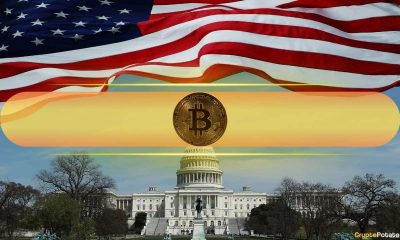

others
Pound Sterling declines toward seven-month low on soft UK wage report – Crypto News
- Pound Sterling remains on the back after the UK wage report remains soft.
- BoE Pill kept doors open for further policy-tightening.
- The UK’s consumer inflation report for September is expected to remain soft.
The Pound Sterling (GBP) retreated after soft wage data dampened consumer spending outlook and elevated hopes of continuation of a neutral interest rate decision by the Bank of England (BoE) in its November monetary policy. The GBP/USD pair remains on the back as the cascading effects of elevating energy prices could trigger a rebound in inflationary pressures in the United Kingdom economy.
BoE policymaker Swati Dhingra commented after the release of the soft wage report that the labor market is really loosening and she doesn’t see further wage growth momentum. Last week, Dhingra said that the central bank could look for rate cuts if the growth rate remains below expectations.
After labor earnings data, investors will focus on the inflation data for September, which will set the undertone of the BoE policy. Inflation in the UK economy is highest in comparison with other G7 economies. Therefore, further softening of consumer inflation would bring some relief for BoE policymakers. Market participants would keep an eye on US President Joe Biden’s visit to Israel to defend themselves against attacks from Palestine.
Daily Digest Market Movers: Pound Sterling falls back after soft wage data
- Pound Sterling drops after failing to climb above the round-level resistance of 1.2200 as the United Kingdom wage data remains softer than anticipated.
- Three month-to-August Average Earnings excluding bonuses softened to 7.8% as expected from the former release of 7.9%. In the same period, the Average Earnings data including bonuses decelerated to 8.1% from the consensus of 8.3% and the prior release of 8.5%.
- Soft wage data would dampen the overall consumer spending.
- The UK’s Office for National Statistics (ONS) reported that the publication of employment numbers was postponed by a week to October 24 due to a delay in covering more respondents by the LFS survey.
- The ONS reported that the delay would “give us additional time to produce the best possible estimates of the labor market using the best available data sources,” as reported by Reuters.
- After wage data, investors will shift their focus on the inflation data for September, which will set the undertone for November monetary policy.
- As per the consensus, the core Consumer Price Index (CPI) data is seen softening to 6.0% from 6.2% recorded in August. Monthly headline CPI expanded at a higher pace of 0.4% vs. the August reading of 0.3%. The annual data is seen decelerating to 6.5% against the former reading of 6.7%.
- Investors seem baffled as to whether the central bank will focus on supporting the economic prospects or return back to the agenda of bringing down inflation to 2%.
- A slowdown in progress in inflation returning to 2% could prompt BoE policymakers to look for raising interest rates further by 25 basis points (bps) to 5.50%.
- If the BoE manages to raise interest rates by a quarter-to-a-basis point, the policy divergence between the Federal Reserve (Fed) and the BoE would square off.
- On Monday, BoE chief economist, Huw Pill, emphasized maintaining high interest rates to tame inflation. Pill added that future decisions regarding interest rates would be “finely balanced”, and kept doors open for further policy tightening.
- The interest rate decision by the BoE for November monetary policy is expected to be impacted by the Israel-Palestine war as the supply chain would be disrupted and the potential cascading effects of rising oil prices could keep headline inflation persistent.
- The market mood remains cautious amid the deepening Israel-Hamas war as the former is set to carry out ground assault in Gaza. This could result in an intervention of more Middle East players, which could elevate conflicts.
- US Secretary of State Anthony Blinken said on Monday that President Joe Biden will visit to Israel to meet Prime Minister Benjamin Netanyahu on Wednesday.
- The US Dollar Index (DXY) finds a cushion near 106.20 after correcting from a weekly high of 106.80 amid a cautious market mood.
- Meanwhile, investors await the speech from Fed Chair Jerome Powell, which is scheduled for Oct 19 before the Economic Club of New York. Investors would watch for November’s monetary policy framework and the outlook on inflation and the economy.
Technical Analysis: Pound Sterling faces sell-off near 1.2200
Pound Sterling faces selling pressure near 1.2200 after soft wage data. The GBP/USD pair trades inside Monday’s trading range as investors await the UK inflation data. The short-term and broader outlook of the GBP/USD pair is bearish as it is trading below the 20-day Exponential Moving Average (EMA) and the 50 and 200-day EMAs have already delivered a death cross. The Cable could decline towards the psychological support of 1.2000.
BoE FAQs
The Bank of England (BoE) decides monetary policy for the United Kingdom. Its primary goal is to achieve ‘price stability’, or a steady inflation rate of 2%. Its tool for achieving this is via the adjustment of base lending rates. The BoE sets the rate at which it lends to commercial banks and banks lend to each other, determining the level of interest rates in the economy overall. This also impacts the value of the Pound Sterling (GBP).
When inflation is above the Bank of England’s target it responds by raising interest rates, making it more expensive for people and businesses to access credit. This is positive for the Pound Sterling because higher interest rates make the UK a more attractive place for global investors to park their money. When inflation falls below target, it is a sign economic growth is slowing, and the BoE will consider lowering interest rates to cheapen credit in the hope businesses will borrow to invest in growth-generating projects – a negative for the Pound Sterling.
In extreme situations, the Bank of England can enact a policy called Quantitative Easing (QE). QE is the process by which the BoE substantially increases the flow of credit in a stuck financial system. QE is a last resort policy when lowering interest rates will not achieve the necessary result. The process of QE involves the BoE printing money to buy assets – usually government or AAA-rated corporate bonds – from banks and other financial institutions. QE usually results in a weaker Pound Sterling.
Quantitative tightening (QT) is the reverse of QE, enacted when the economy is strengthening and inflation starts rising. Whilst in QE the Bank of England (BoE) purchases government and corporate bonds from financial institutions to encourage them to lend; in QT, the BoE stops buying more bonds, and stops reinvesting the principal maturing on the bonds it already holds. It is usually positive for the Pound Sterling.
-

 Blockchain20 hours ago
Blockchain20 hours agoOn-Chain Tokenization for Payments Professionals – Crypto News
-
Cryptocurrency6 days ago
Pi Community Highlights Pi Coin’s Slow Growth As ‘Strategic’ – Crypto News
-

 others1 week ago
others1 week agoThere is more work to do on inflation – Crypto News
-

 Cryptocurrency1 week ago
Cryptocurrency1 week agoProfessor Coin: What’s Driving Cryptocurrency Adoption Around the World – Crypto News
-

 Blockchain1 week ago
Blockchain1 week agoCZ claps back against ‘baseless’ US plea deal allegations – Crypto News
-

 Technology1 week ago
Technology1 week agoApple ramps up India production amid China uncertainty, assembles $22 billion worth iPhones in a year – Crypto News
-
Business5 days ago
Cardano (ADA) and Dogecoin (DOGE) Eye For Bullish Recovery – Crypto News
-

 Business5 days ago
Business5 days agoWorldpay and FIS Deals Echo 2019’s Payments Megamergers – Crypto News
-
![Shiba Inu [SHIB] price prediction - A 70% rally next after 900%+ burn rate hike?](https://dripp.zone/news/wp-content/uploads/2025/04/Shiba-Inu-SHIB-price-prediction-A-70-rally-next-400x240.png)
![Shiba Inu [SHIB] price prediction - A 70% rally next after 900%+ burn rate hike?](https://dripp.zone/news/wp-content/uploads/2025/04/Shiba-Inu-SHIB-price-prediction-A-70-rally-next-80x80.png) Cryptocurrency1 week ago
Cryptocurrency1 week agoShiba Inu [SHIB] price prediction – A 70% rally next after 900%+ burn rate hike? – Crypto News
-

 others1 week ago
others1 week agoGold consolidates near all-time peak as bulls pause for breather – Crypto News
-

 Cryptocurrency7 days ago
Cryptocurrency7 days agoWhite House Mulls Bitcoin Reserve Backed by Gold and Tariffs – Crypto News
-

 Cryptocurrency5 days ago
Cryptocurrency5 days agoOKX Returns to US Market Following $505M DOJ Deal – Crypto News
-

 Blockchain5 days ago
Blockchain5 days agoSolana Turns Bullish On 8H Chart – Break Above $147 Could Confirm New Trend – Crypto News
-

 Blockchain1 week ago
Blockchain1 week agoXRP Price To Hit $45? Here’s What Happens If It Mimics 2017 And 2021 Rallies – Crypto News
-

 others1 week ago
others1 week agoRipple Community Remains Disappointed With Hinman Report, What’s Next? – Crypto News
-

 Metaverse1 week ago
Metaverse1 week agoForget DeepSeek. Large language models are getting cheaper still – Crypto News
-

 others1 week ago
others1 week agoCrypto Strategist Sees Solana-Based Memecoin Surging Higher, Says One AI Altcoin Flashing Strong Chart – Crypto News
-

 Cryptocurrency1 week ago
Cryptocurrency1 week agoPepe is on the verge breakout to $0.0000078 as gold cross nears. – Crypto News
-

 Blockchain5 days ago
Blockchain5 days agoBitcoin online chatter flips bullish as price chops at $85K: Santiment – Crypto News
-

 Cryptocurrency5 days ago
Cryptocurrency5 days agoJudge Pauses 18-State Lawsuit Against SEC, Saying It Could ‘Potentially Be Resolved’ – Crypto News
-
Business5 days ago
Coinbase Reveals Efforts To Make Its Solana Infrastructure Faster, Here’s All – Crypto News
-
Technology4 days ago
Expert Predicts Pi Network Price Volatility After Shady Activity On Banxa – Crypto News
-

 Technology1 week ago
Technology1 week agoHow to transcribe and translate YouTube videos for free using Gemini 2.5 Pro? Check our step-by-step guide – Crypto News
-

 Cryptocurrency1 week ago
Cryptocurrency1 week agoFusaka fork takes shape as Pectra enters final stretch – Crypto News
-

 others1 week ago
others1 week agoBinance Issues Important Update On 10 Crypto, Here’s All – Crypto News
-

 Cryptocurrency1 week ago
Cryptocurrency1 week agoBitcoin – Here’s what’s next after sellers near exhaustion levels – Crypto News
-

 others1 week ago
others1 week agoOn-Chain Indicator Suggests Ethereum (ETH) Could Be Undervalued, According to Crypto Analyst – Crypto News
-

 others1 week ago
others1 week agoMexican Peso ends week strong as USD plunges on China tariff retaliation – Crypto News
-

 Blockchain1 week ago
Blockchain1 week agoOn-Chain Clues Suggest Bitcoin Bounce Might Be a False Signal—Here’s What to Know – Crypto News
-

 others1 week ago
others1 week agoChina’s Copper imports drop – ING – Crypto News
-

 Cryptocurrency6 days ago
Cryptocurrency6 days agoA decade in, Liberland needs the Bitcoin standard more than ever – Crypto News
-

 Technology5 days ago
Technology5 days agoIndia, Australia explore bilateral data-sharing treaty to tackle cybercrime – Crypto News
-

 Technology5 days ago
Technology5 days agoMoto Book 60 laptop, Pad 60 Pro launched in India: Price, features, battery and more – Crypto News
-
Technology5 days ago
Coinbase Reveals Efforts To Make Its Solana Infrastructure Faster, Here’s All – Crypto News
-
others5 days ago
Coinbase Reveals Efforts To Make Its Solana Infrastructure Faster, Here’s All – Crypto News
-
others4 days ago
How High Should Dogecoin Price Rise to Turn $10K to $100K? – Crypto News
-

 Technology1 week ago
Technology1 week agoPrice drop on 43 inch TVs: Grab the best deals on Samsung, Sony, Xiaomi and more, up to 57% off – Crypto News
-

 Technology1 week ago
Technology1 week ago3 Altcoins to Buy as US Senate Banking Chair Gives August Deadline For Major Crypto Bills – Crypto News
-

 Blockchain1 week ago
Blockchain1 week agoBoosting Ethereum: Bankless Cofounder Lays Out New Vision For Price Surge – Crypto News
-
![Bearish sequence in Nifty favors downside [Video]](https://dripp.zone/news/wp-content/uploads/2025/02/Bearish-sequence-in-Nifty-favors-downside-Video-Crypto-News-400x240.png)
![Bearish sequence in Nifty favors downside [Video]](https://dripp.zone/news/wp-content/uploads/2025/02/Bearish-sequence-in-Nifty-favors-downside-Video-Crypto-News-80x80.png) others1 week ago
others1 week agoDow Jones recovers ground to post one of its best weeks in years – Crypto News
-

 Cryptocurrency1 week ago
Cryptocurrency1 week agoScottish School Will Accept Bitcoin Payments, May Launch BTC Reserve – Crypto News
-

 Blockchain1 week ago
Blockchain1 week ago‘Bitcoin Standard’ author to develop Austrian economics curriculum for UK school – Crypto News
-

 Business1 week ago
Business1 week agoMichael Saylor Hints At Another MicroStrategy Bitcoin Purchase, BTC Price To Rally? – Crypto News
-

 others1 week ago
others1 week agoMantra Team Responds As The OM Token Price Crashes Over 80% In 24 Hours – Crypto News
-

 others1 week ago
others1 week agoUSD/CAD falls toward 1.3850 due to potential US recession, persistent inflation – Crypto News
-

 Blockchain1 week ago
Blockchain1 week agoCrypto markets ‘relatively orderly’ despite Trump tariff chaos: NYDIG – Crypto News
-

 others6 days ago
others6 days agoPresident Trump Planning Launch of New Monopoly-Inspired Crypto Game: Report – Crypto News
-

 Blockchain6 days ago
Blockchain6 days agoStablecoins’ dominance due to limitations of US banking — Jerald David – Crypto News
-

 Cryptocurrency5 days ago
Cryptocurrency5 days agoSOL remains bullish amid broader market stagnation – Crypto News
-

 Technology5 days ago
Technology5 days agoSpotify down: Music streaming giant leaves thousands of users affected globally – Crypto News












